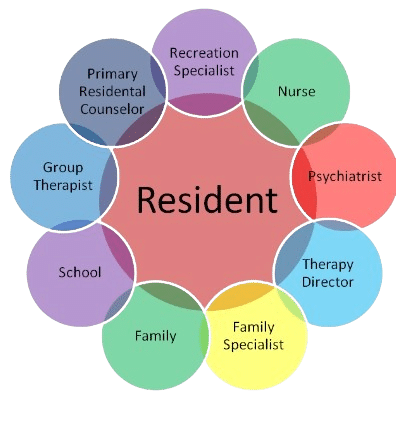Explore Our Program
Psychiatric Residential Treatment for Adolescents in Spokane

Learn more about our:
Discover Our Approach
Discover our approach to guiding youth towards understanding their strengths, learning healthy behaviors, and practicing skills to help them build a positive future.
Who we can help:
- Medically-stable adolescents.
- Adolescents ages 12-17 years.
- Adolescents with a minimum full-scale IQ of 80 or above.
- Must demonstrate sufficient cognitive ability to participate.
- Adolescents must present one or more of the following conditions:
We Are Not the Right Fit For:
- Adolescents physically unable to adequately care for themselves.
- Adolescents with a history or level of aggression that could compromise the safety of the milieu (social environment).
- Adolescents who exhibit behaviors more consistent with an acute psychiatric hospital level of care.
How We Help Teens
Tamarack uses evidence-based practices to help the resident’s in our care.

Dialectical Behavior Therapy (DBT)
We utilize Dialectical Behavior Therapy (DBT). This evidence-based approach equips kids with life skills that go beyond treatment and gives them the tools that they need them to manage emotions, navigate relationships and work towards their long-term goals.

Treatment Team Approach
A multi-disciplinary group of mental health professionals collaborate on the care of each resident and comprise their clinical treatment team.
These include:
The Family who knows the resident the best and can provide the needed information and insight into the treatment planning process.
The Child Psychiatrist who directs the clinical care of each resident. The psychiatrist meets with each resident every week.
The Therapy Director who oversees the clinical work performed by the Family Specialists and Primary Residential Counselors.
The Family Specialist who facilitates weekly family and individual therapy sessions with their assigned residents from the admission to discharge. Additionally, a Family Specialist also facilitates group therapy with the residents.
The Primary Residential Counselor who works daily with residents providing behavioral sessions and interventions.
The Education Coordinator who provides schooling for the residents.
The Nurse who provides medical oversight of the residents.
The Recreation Department who provides recreational activities to the residents.

Individualized Care
We work with each youth and family to address the unique issues that have brought them to treatment. Treatment plans and interventions are tailored to reflect the goals individually created and driven by the residents and their families.

EMDR
We offer Eye Movement Desensitization and Reprocessing (EMDR). This approach helps guide your teen through the processing of traumatic memories and diminishes the emotional hold of past experiences in order to help them build resilience and regain control over their life
Family Participation
How it works
From the start, you’ll have a dedicated Family Specialist by your side who will keep you informed and involved in your teen’s progress. We also hold weekly family therapy sessions to create a clear treatment plan including discharge goals, milestones, and for establishing healthy boundaries for everyone.
Why is family participation important?
Family participation is vital to treatment at Tamarack. We recognize that each youth that we serve is part of a family system, and we work with that system to identify goals to help family members be more available and responsive to each other’s needs. We hold weekly family therapy sessions and work with everyone to identify areas that need additional skills and support. Families are encouraged to spend time with their teens both on and off-site, and residents are often able to go on home visits prior to discharge to allow them opportunities to practice new skills and strategies with their families.


Need More information?
We’re here to help!
Daily Schedule
*Therapy sessions and focus groups are interspersed through the week. The schedule below represents a typical week and is subject to change.
Weekdays (Mon - Fri):
7:00-7:30am
7:30-11:30am
11:30-12:00pm
12:00-1:00pm
1:00-1:45pm
1:45-2:00pm
2:00-3:00pm
3:00-4:30pm
4:30-5:00pm
5:00-5:30pm
5:30-6:00pm
6:00-7:00pm
7:00-7:45pm
7:45-8:00pm
8:00-8:30pm
8:30-9:00pm
Breakfast
School (with break and snack)
Lunch
School
Free Time
Snack
Group
Recreation Therapy
Quiet Time
Quiet Time
Quiet Time
Recreation
Free Time
Snack
Personal Hygiene
Bed time
Weekends (Sat & Sun):
9:00-9:30am
9:30-10:30am
10:30-11:30pm
11:30-12:30pm
1:00-2:45pm
4:30-5:30pm
9:00-10:00pm
Breakfast
Personal Hygiene
Group
Free Time
Free Time
Quiet Time
Late Night on Saturday
On-site Schooling
How it works
Our teachers work with resident’s home school district to ensure that residents are enrolled in classes to help them make or maintain academic progress during treatment. Depending on the student’s location, we may be able to help them transition back to a community school setting for a smooth return to “normal.”
Why on-site schooling?
School can be a significant stressor for the youth that we serve, and we understand the importance of education continuing while residents are receiving residential care. We are integrated with Spokane School District 81 so our residents can maintain their educational goals while also focusing on positive behavior and relationship-building.


Recreation
Life at Tamarack Center Offers Recreation to Promote Emotional Well-Being
Recreation plays an important role in the recovery process for adolescents during residential treatment. Physical activity is vital for mental and emotional health, and it helps to relieve stress, boost mood, and develop healthy social connections. Residents at Tamarack have opportunities to engage in a wide-variety of physical activities, games, arts and crafts and community events to help promote well-being.
Our Recreation Activities May Include:
Active Recreation
- Volleyball
- Softball
- Tennis
- Field Hockey
- And More
Soothing Recreation
- Knitting
- Beading
- Painting
- Art and Crafts
- Mask-making
- And More
Event Recreation
- Nature Hikes
- Community Art Events
- Trips to the Public Library and YMCA
- Plays and Movies
- Seasonal Events
- And More




Give your Teen the Tools to Grow
and succeed in life

